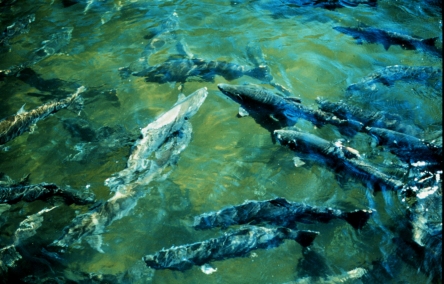Well, how completed has our food supply become? Given our environmental damage of rivers and oceans, we've pushed to raise fish on farms. As you will see below, the results have not always been great, and just became much worse with this salmon release into the Pacific.
Perhaps this is like our discussions around AI. A new frontier with dangerous potential ramifications, yet scientist and tech experts claim "there's nothing to worry about". Really? Who has "everything under control." other than Almighty God? Our fate in the hands of a few bent on making money? Not a good formula.
Lot going on in this story--failed safeguards, Mother Nature taking over, as usual, threats to native fish, threats to our native eco-system corrupted by man, etc. Will fisherman come tot he rescue and clean up the escaped the farmed salmon? If not there will be devastating consequences to deal with.

Contrary to assurances by fish farming concerns, thousands of farmed Atlantic salmon have escaped into the Pacific Ocean. They escaped from a damaged net pen at a Cooke Aquaculture fish farm off Cypress Island in Washington’s Puget Sound on Saturday, This has sparked fears that the farm-raised fish could threaten wild Pacific salmon.
According to the Washington Department of Fish and Wildlife (WDFW), 305,000 salmon were in the net pen at the time. The company estimates that 4,000-5,000 fish escaped.
The concept and practice of farmed salmon has been a controversy since its inception.
Here are a few facts about the farmed fish or in aquaculture industry:
- Atlantic salmon are the most commonly commercially farmed salmonids.
- Salmonids (particularly salmon and rainbow trout), along with carp, are the two most important fish groups.
Environmental groups have long criticized the practice of aquaculture. According to Food & Watch, “massive amounts of antibiotics, hormones, and pesticides are required to keep disease at bay just to keep fish and shrimp alive in overcrowded conditions (typically in nets, cages, or ponds).”

Crowded salmon pens where farmed salmon are pumped full of antibiotics and riddled with sea lice and tumors
There is a high risk of contamination from farmed fish. The risk to the surrounding environment – our oceans – from uneaten fish feed, fish waste, and any antibiotics or chemicals used in fish farm operations can be disastrous to marine life.
And farmed Atlantic salmon that escape into the Pacific pose an even greater danger.
“Salmon farms are extremely harmful to wild fish because they break natural laws, releasing dangerous levels of viruses, bacteria and sea lice into the water,” the Sea Shepherd Conservation Society warns on its Operation Virus Hunter campaign website. “Wild salmon are declining wherever there are salmon farms.”
Environmentalists and others are also deeply concerned that these escaped fish will make it into our rivers, thus spreading their diseases to native fish there.
Farming fish companies like Cooke Aquaculture Scotland have always insisted these penned in fish couldn’t escape. Sounds amazingly like when the tobacco industry kept claiming that cigarettes couldn’t cause cancer.
And here we are.
“Exceptionally high tides and currents coinciding with this week’s solar eclipse caused damage to a salmon farm that has been in operation near Cypress Island for approximately 30 years,” the company said.
So what’s the stop-gap remedy for this potential environmental disaster?

Farmed salmon vs wild salmon – a cautionary tale for consumers
Calling all anglers please!
Even though local anglers are concerned that the Atlantic salmon will eat local salmon, they’re now being called upon to go fishing for these escaped fish.
The Washington Department of Fish and Wildlife is encouraging anglers to specifically get out there and catch the escaped salmon, said to be 8 to 10 pounds in weight and considered safe to eat.
Safe to eat? When they’re known to be chock full of antibiotics and carry sea lice and riddled with open sores, swollen gills, tumors and deformities? Sounds appetizing, yes?
The Guardian reported in April that the sea louse, or salmon louse, is eating into farmed Atlantic salmon supplies in Scotland, Norway, Iceland and Canada, driving salmon prices higher and creating a “chemical arms race in the seas.” Salmon companies worldwide are spending an estimated $1.25 billion a year combined to tackle such outbreaks.

Compare farmed salmon versus wild caught. The difference in unmistakable.
So, just like the companies that are steamrolling to get natural gas pipelines laid across the country that they SWEAR won’t leak (and we know that they do and will), these companies are swearing that this is a tragic error created by an act of God.
Seriously?
Ron Warren, head of WDFW’s Fish Program, says there is no evidence farmed salmon pose a threat to native fish populations, either through disease or crossbreeding with Pacific salmon. To date, he said, there is no record of Atlantic salmon successfully reproducing with Pacific salmon in Washington’s waters.
All it takes is one and we’ve seen this happen with other scenarios already.
Isn’t it time consumers put our collective feet down and insist that these unnatural “farms” be scrapped and that conservation of wild fish be attended to? Can we really trust these companies to keep their word, when natural disasters are to be expected?
It’s time for commonsense to reign. And for consumers to speak up.

No comments:
Post a Comment